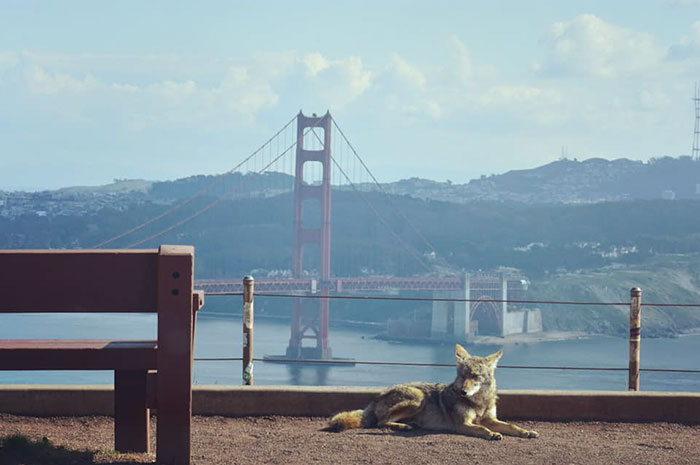As we keep to our homes more and more, wildlife is coming into the city to explore. Luckily for us, there’s always a camera nearby to capture such moments for “d’awws” and “aawws” on social media.
But not all animals are enjoying themselves equally. With zoos shutting their gates to the public, and amid growing concern that staff could unwittingly infect them, some zoo animals are starting to miss getting attention — but they’re also getting busy.
The goats of Llandudno

Image via Medium.
“Llandudno has a herd of wild goats, which date back to the 1800s. They do like to come down the hillside, as seen many, many times previously — and documented extensively by my colleagues at North Wales Live and the Daily Post,” Stuart explained for Medium.
“They are still wary of people and human life. Normally, they are put off going much further than the bottom of the Great Orme because of how busy it is (in relative terms — this is still Llandudno after all, and not inner-city Manchester). However, thanks to the Covid-19 lockdown, the goats didn’t have any traffic, people or noise stopping them — so they ventured out.”
The goats do seem to enjoy themselves, as they chew through local shrubbery and gardens, sunbathe in a churchyard, and even “blocked traffic”. However, they are still wary of coming close to humans.
This sleepy fox somewhere in Canada

Sara, who is currently pursuing a Ph.D. at Texas Tech, Tweeted that her dad who lives somewhere in Canada “had been sending me and my sister updates [on the fox] all day” and has even named it Nezuko.
It’s not hard to see why.
Foxes are one of the more often-spotted animals in this period, from what I’ve seen so far. There’s a lot of fox photos to enjoy in the replies to Sara’s tweet if that’s your thing (it definitely is mine).
A chill coyote

Image credits beccatravels / Reddit (Becca Cook).
San Francisco is no stranger to coyotes. They live in the woods near the Bay Area and are generally content to stay away from people or ignore them if they meet. This one, however, looks very pleased that the normal hustle and bustle of the city has been curtailed in order do get some peace and quiet with a view.
But while this coyote is enjoying itself, others are hard at work resolving local politics.
“We had coup d’etat if you will,” Presidio Wildlife Ecologist Jonathan Young told ABC News about a fight that broke out in between the animals a few days ago. “A new alpha pair came and took over and kicked out the old alpha pair.”
“Since the COVID shelter-in-place, the winding trails and idle golf course [around the city’s Presidio] have become a go-to refuge for neighbors and more importantly their dogs. For the next few weeks or months, that’s potential trouble.”
The Presidio Trust cautions people that coyotes aren’t typically aggressive, but will regularly be on the hunt or defend themselves from domestic pets. It’s also a pupping season currently, so people would best try to avoid these animals. Sections of the Park Trail and the Bay Area Ridge Trail will be closed to hounds starting April 6 for the next few weeks or months over concerns about safety.
What’s happening in the zoos
We’ve just had our first confirmed case of the coronavirus jumping from a human to a tiger, and zoo staff are understandably worried that they may unwittingly infect their charges. As such, zoos around the world are implementing measures to limit the risk by reducing the animal’s exposure with their handlers and the public.
The US Centers for Disease Control and Prevention (CDC) has since reiterated that there is no evidence yet that pets can spread COVID-19 to people or that they might be a source of infection in the US, but zoos and conservation centers are still being especially careful. For example, the Borneo Orangutan Survival Foundation, a rehabilitation center for orangutans in Borneo, closed its doors to all visitors and asked the caretakers to wear masks and protective gloves when working with the primates, which are burned after the working day is over.

Image credits J. Patrick Fischer,
Nathan Hawke from Orana wildlife park in New Zealand told The Guardian that although visitors are no longer permitted, many of the park’s animals continue to come for their daily ‘meet the public’ appointments. Other groups of animals that are accustomed to human presence also seem to miss us, too, although the feeling may be forming through their stomach more than through their hearts.
Privacy, perhaps, was just what some of these species had been missing, however. Staff at the Ocean Park in Hong Kong reported that the 14-year-old resident female and male giant pandas Ying Ying and Le Le have “succeeded in natural mating” two days ago — because there aren’t any rules on panda social distancing.
This is the first success since attempts at natural mating began a decade ago, and the staff is excited for the birth, as the species is currently considered vulnerable in the wild but attempts to breed more giant pandas in captivity have been remarkably frustrating.






